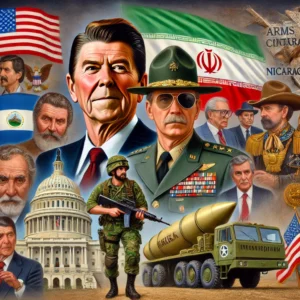The Iran-Contra affair stands as one of the most controversial episodes in American political history, exposing covert operations and illegal activities within the Reagan administration. The scandal involved the clandestine sale of arms to Iran and the unlawful funding of Nicaraguan Contra rebels, raising significant questions about presidential accountability and government transparency.
The Covert Operations
In the mid-1980s, the Reagan administration found itself in a precarious situation. On one hand, the U.S. was grappling with hostages held by Hezbollah in Lebanon, a group with ties to Iran. On the other, there was an intense desire to support the Contras, a group of anti-Sandinista rebels in Nicaragua, who were fighting the Sandinista government that the Reagan administration viewed as a Marxist threat in Central America.
To address these issues, senior officials within the administration orchestrated a secret plan to sell arms to Iran, despite a strict arms embargo. The idea was to secure the release of American hostages while simultaneously generating funds to support the Contras. This plan directly violated the Boland Amendment, which had been enacted to prohibit U.S. assistance to the Contras.
Public Revelation and Investigation
The covert operations came to light in November 1986, when a Lebanese magazine first reported the arms sales to Iran. This revelation triggered a media frenzy and widespread public outrage. Soon after, it was uncovered that the proceeds from these sales were being diverted to fund the Contra rebels.
In response, Congress launched extensive investigations, and an independent counsel was appointed to delve into the affair. Key figures, including Lieutenant Colonel Oliver North, National Security Advisor John Poindexter, and Secretary of Defense Caspar Weinberger, were implicated in the illegal activities. The investigations revealed a complex web of deceit, cover-ups, and unauthorized actions taken by government officials.
Outcome
The Iran-Contra affair led to several high-profile convictions. Oliver North and John Poindexter were among those convicted on charges including obstruction of justice and lying to Congress. However, many of these convictions were later vacated on appeal. In a controversial move, President George H.W. Bush pardoned six individuals involved in the scandal, including Weinberger, on Christmas Eve in 1992.
President Ronald Reagan claimed he had limited knowledge of the details, insisting that he was unaware of the extent of the operations. Despite this, he faced significant criticism for his administration’s lack of oversight and the breach of public trust. The affair not only tarnished Reagan’s legacy but also led to increased scrutiny of executive power and the implementation of reforms to prevent similar abuses in the future.

The Iran-Contra affair remains a poignant example of the complexities and potential dangers of covert government operations. It underscores the importance of transparency, accountability, and adherence to the rule of law in maintaining public trust and upholding democratic principles.
